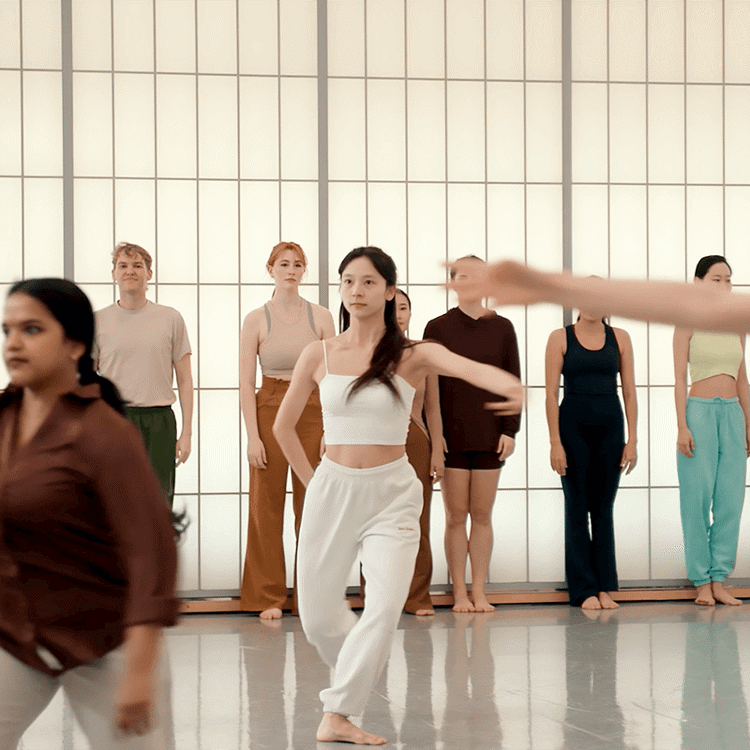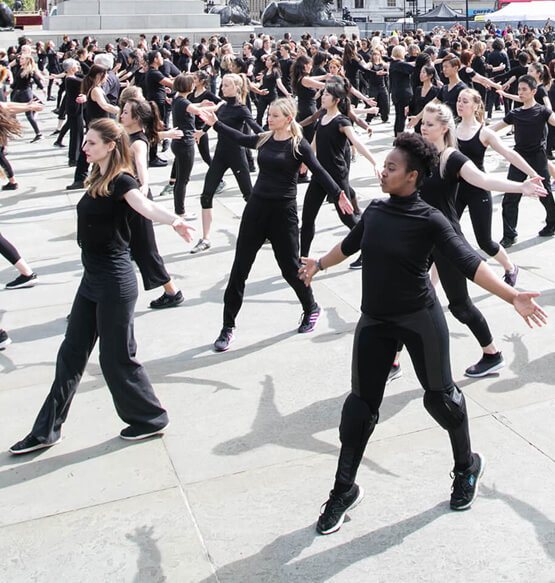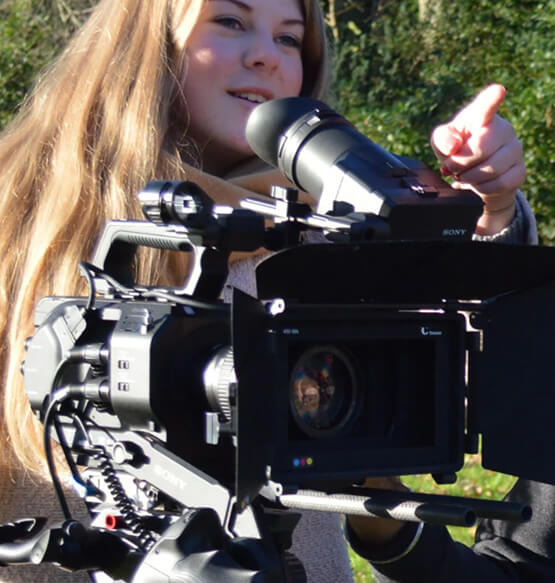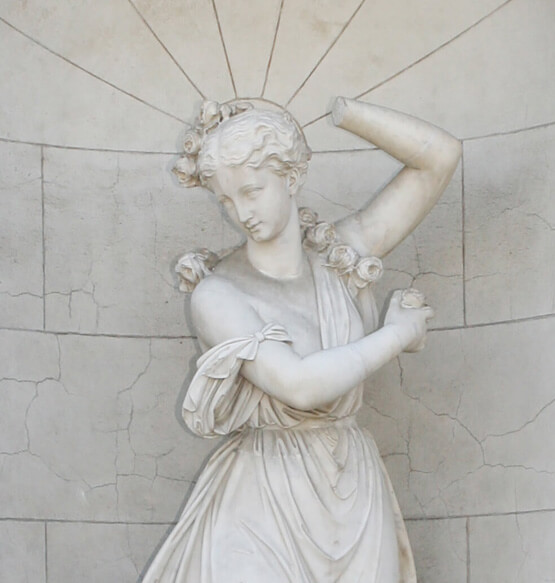Duration:
2 years (full-time)
Number of credits:
240 credits
Start date(s):
September 2026
Discover and develop a unique vision for the impact of your practice – your dance manifesto.
Designed to respond to the shifting demands of the sector, this programme integrates creative, technical, digital, professional, and entrepreneurial skills, preparing you for your professional career.
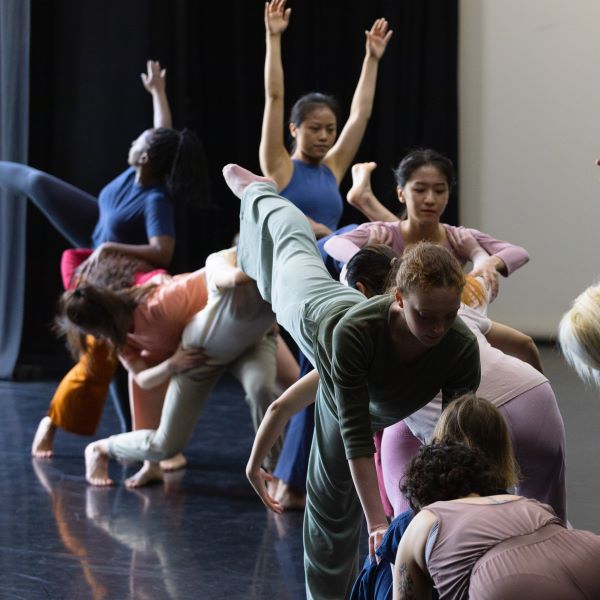
Why study MFA Dance and Embodied Practice at Roehampton?
- Forge your unique vision: the blend of practical, contextual, and industry-based explorations allows you to apply skills across diverse artistic, educational, community contexts, and and, less conventionally, in galleries and museums to outdoor sites. This focus on experimentation and ambition prepares you for multiple professional pathways while cultivating a deeply personal, visionary approach to dance.
- Practice, innovate, and collaborate: you’ll develop and test new ideas and skills in dance ‘laboratory’ sessions, and research and practice notions of dance facilitation, dance teaching, dance leadership, dance intervention, and dance-making in a variety of contexts. This unique, practice-based approach will expand your understanding of wellbeing and safe, healthy dance practice, and relates directly to social, political and cultural issues around embodiment, community, and the environment.
- Build skills for impact and change: over the two years, you’ll acquire a comprehensive set of technical, creative, and professional skills, from composition and production to project management and critical reflection. You’ll graduate as a visionary practitioner, capable of making meaningful contributions across theatre, screen, policy, education, and community initiatives.
Modules
Module overview
These practical classes provide a framework for you to explore movement potential using a variety of approaches. Technical, performance, improvisational and interpretative skills are addressed using the interplay between action, imagination, observation and questioning.
You will be encouraged to reflect on your own practices as dancers and to find ways to explore detailed kinesthetic awareness through testing (trial and error) and to define how movement is experienced in relation to space, time and gravity. You will be involved in expressive and interpretative tasks in response to music, sound accompaniment or text and work with other dancers to locate synergies and sensitivity in your danced relationships.
You will experience a variety of practices as part of the portfolio. The approach and demands of each class will vary according to the interests and expertise of each tutor offering a range of experiences from within the professional field.
Teaching and learning
The delivery of this modules is four, one and half hour practical studio sessions per week.
There will be an additional 30 minutes of digital support per week. This will consist of audio-visual resources that accompany and support the practice delivery.
Teaching practice is aligned with the core principles of UDL and our philosophy is to be inclusive, respectful and accessible to all. Practical classes, workshops, peer review and tutorials. Peer review and critical feedback will be included in all sessions and tutorials can be booked during office hours.
Formative feedback is inherent in the delivery of a dance practice sessions and provided through manifold embodied perspectives covering the full range of learning styles, including physical/kinaesthetic, aural/auditory-musical, visual/spatial, verbal/linguistic, logical/anatomy-somatic, intra and interpersonal approaches.
Furthermore, every session involves tasks and/or mini projects which provide opportunities for peer and tutor feedback and formative learning.
Group and individual tutorials outside of the taught sessions offer opportunities to discuss individual interests, challenges and projects.
Assessment
This module will be assessed using a practical class 1 (30%) and a practical 2 (50%).
Module overview
This module interrogates practically and theoretically the question of what happens when we have a creative encounter. It investigates what happens when we have a creative encounter with others, such as established and novel lines of enquiry for dancers and performers; encounters in new settings in and outside of dance; and in and with institutions such as museums; work with and for different communities; and critical artistic engagement with past and present contexts.
It investigates how we might engage together in a creative practice and queries why a practice might be important, or excluding, or lean into an embodied, relational engagement necessary to create the work we are passionate about.
The module will explore topics that put the creative encounter front and centre, for example, leadership and collaboration, working with other professional artists and those who come to dance for the first time; delving into the topics of cultural heritage and community; institutional contexts and working through how we use creative practice to engage with topics such as care, socially engaged facilitation, audience relation, direction, producing, curating; showcasing topics connected to why we do this, for example to make an impact on health, empowerment, society, audiences, institutions, cultural engagement and interpretation; creating the ‘what if...’, using our imaginations to set up creative encounters as dance activists, artists, vision-makers of the future.
Teaching and learning
This is a year-long module, consisting of one, two-hour seminar, workshop or experiential laboratory per week.
The sessions will be a mixture of practical and theoretical engagement and indicated clearly to students.
There will be an additional 30 minutes of online digital support per week. This will consist of audio-visual resources will deepen understanding and support practice and thinking.
Assessment
This module will be assessed using a digital exposition (50%) and a project presentation (50%).
Module overview
This module will anchor your knowledge and understanding so that you are able to interrogate your existing dance practice and training with a view to developing new ideas and new movement forms.
The module will be strongly underpinned by the Thinking through Performance and Dynamic Spaces modules, which are compulsory to all programmes, drawing particularly on the central themes of creative methods of artistic enquiry from the point of view of the practitioner, decolonising and decentring of methodological conventions, and embracing of multiplicity in conceiving, engaging and generating knowledges.
Through a collaborative and constructive laboratory environment, the module will give opportunities to adapt dance practices for engagement in a range of contexts. The module will explore ways to engage with dance and identify ways to make dance ‘public’ using a range of methods to communicate creatively to envision and produce artistic projects, moving from the conventions of the dance studio and theatre to the outdoor environment, into galleries and museums, and into educational and healthcare settings.
Weekly questions, tasks and assignments will encourage you to investigate and to question the shifting roles of ‘a dancer’. Workshop tasks and provocations will sit alongside site, museum and gallery visits to develop dexterity, personal resources, communication skills and versatility. The module also seeks to develop your working knowledge of dramaturgy and your capacities of observation, responsiveness and critical awareness in constructing self/peer review and feedback.
Teaching and learning
This module consists of one, two-hour workshop. There will be an additional 30 minutes of online digital support per week. This will consist of audio-visual resources that accompany and support the practice delivery.
This is a year-long module because the development of individual embodied practice is core to this programme. Weekly sessions include series of practical workshops, individual and collaborative laboratory tasks, offsite visits, feedback sessions, seminars and tutorials.
Key assessment points will be allocated during the year – formative at the end of the first term, and summative mid-spring term and at the beginning of summer term.
Assessment
This module will be assessed through a co-teaching 60 minutes dance practice class (team-pair or trio) (50%) and a devised group choreography and perforrnance (70%).
Module overview
This module develops the work studied in Dance Practice. Approaching Performance and will deepen technical and artistic understanding and their exploration of movement potential using a range of practices.
You will critically interrogate your technical knowledge of dancing and deepen your awareness of communicating movement. You will be involved in expressive and interpretative tasks in response to music, sound accompaniment or text and work with other dancers to locate synergies and sensitivity in their danced relationships. Focus will be on performative qualities alongside essential technical practice.
Via a performative presentation, you can demonstrate advanced performance skills and the problems and possibilities of ‘being seen’ (Deborah Hay) considering ‘dancing as an ensemble’ as well as the performer-audience relationship.
You will experience a variety of practices as part of the portfolio. The approach and demands of each class will vary according to the interests and expertise of each tutor offering a range of experiences from within the professional field.
Teaching and learning
This module consists of four, one and a half dance studio practice classes per week
Teaching practice is aligned with the core principles of UDL and our philosophy is to be inclusive, respectful and accessible to all.
Practical classes, workshops, peer review and tutorials. Peer review and critical feedback will be included in all sessions and tutorials can be booked during office hours.
Formative feedback is inherent in the delivery of a dance practice sessions and provided through manifold embodied perspectives covering the full range of learning styles, including physical/kinaesthetic, aural/auditory-musical, visual/spatial, verbal/linguistic, logical/anatomy-somatic, intra and interpersonal approaches.
Every session involves tasks and/or mini projects which provide opportunities for peer and tutor feedback and formative learning.
Group and individual tutorials outside of the taught sessions offer opportunities to discuss individual interests, challenges and projects.
There will be an additional 30 minutes of online digital support per week. This will consist of audio-visual resources that accompany and support the practice delivery.
Assessment
This module will be assessed using a practical dance class (50%) and a performative studio presentation (50%).
Module overview
This module invites you to interrogate artistic and performance practices, including your own modes of making, as forms of research discovery. It explores the relations between practice and different forms of codified and non-codified knowledge from the perspective of practitioners in dance, performance or other creative practices; and through exploration of concepts, theories and assumptions which underpin and inform performance.
Combining practice-as-research methodologies with philosophical enquiry, you will be challenged to deploy a range of critical research methodologies which combine the kinaesthetic, the self-reflective and the theoretical.
The module supports you to understand how artistic processes can be used to generate and embrace a multiplicity of conceiving, engaging and generating knowledges. Key topics include the nature of performance as art, epistemology, and the aesthetics and ethics of dance and performance, including the questioning of power structures within the field. These issues are examined through a combination of readings, discussions, practical tasks and embodied experiences, providing space to consider the cultural, political and ethical ramifications of performance practices in studio-based, classroom-based and hybrid settings.
Teaching and learning
This module is taught through a one, two-hour seminar and one, two-hour hybrid session per week.
Lecture and seminars will cover philosophical examinations of performance, while hybrid sessions interrogate the nature of artistic practices as a method of research.
There will be an additional 30 minutes of online digital support per week. This will consist of audio-visual resources will deepen understanding and support practice and thinking.
Assessment
This module will be assessed using a presentation (50%) and a blog (50%).
Module overview
This interdisciplinary module provides a dynamic exploration of ways in which choreography, media and the environment intersect in the 21st century, fostering critical inquiry and creative practice across a range of disciplines.
It invites you to reimagine choreography as not only embodied performance but also as a site for creative engagement with diverse media, and to work with others in diverse environmental contexts.
In response to global challenges, the module addresses how shifting social, political, and ecological environments may require new forms of critical thinking, collaboration, and creative practice. Through the lens of post-humanist theory, including material cultures, new materialism and Anthropocene concepts, the module emphasises the relational ontology of the world, where human-centric views are de-centered, and the embodied interactions between people, non-human entities, and ecosystems are highlighted.
You will engage with choreography as a practice that transcends traditional boundaries, incorporating both material and digital realms while embracing the interconnectedness of all living systems. This approach also emphasises the importance of community building on a global scale, inviting you to understand how your work might respond to the environmental and socio-political forces shaping our world today.
Teaching and learning
This is a year-long module, consisting of one, two-hour session per week.
This extended structure addresses the multi-layered nature of the module, in which you will learn to produce a group project in response to a mediated environment and tools, as well as to curate and produce an exhibition at the end of the spring at a high professional standard, which aligns with the aim or professionalisation.
Practical workshops will cover the compositional and choreographic practice, while seminars will consist of hybrid exploration of the contextual understanding of choreography more broadly.
Seminars and practical site-specific (and medium-specific) workshops will embed collaborative formative tasks, tutorials and peer review. There will be technical workshops (such as filming, editing, Adobe Cloud Suite as well as drawing and collaging for performance).
To contextualise and generate new creative approaches, the module will include dedicated field trips to cultural centres and performance art spaces (e.g., the ICA, Tate Modern, the Barbican), as well as to natural environments (e.g., discovering new spaces at Roehampton campus, and London ecological sites (such as, Richmond Park, Barnes Wetlands, Kew Gardens and others).
Assessment
This module will be assessed using a production portfolio (40%) and a mediated / site-specific choreography project (50%).
Module overview
The project is a ‘practice dissertation’. The module provides opportunities for you to undertake independent practice research in order to deliver a range of materials relating to your interests as dance practitioners including classes, workshops, screen dances, installations, and performances.
You will be encouraged to develop professional, outward-facing projects in order to engage with a unique vision for the impact of their practice – a dance manifesto. The module explores the inception, planning and production of longer periods of teaching and workshop delivery in order to examine the scope of curricula and artistic aims or perspectives, and the implications of these for design and evaluation. You will develop original research which is supported by tutorials, peer review and open classes, and workshops.
Teaching and learning
This is a year-long module consisting of two, two-hour workshops per week. It operates as a series of practical workshops, laboratory tasks, offsite visits, feedback sessions, seminars and tutorials. Key feedback points are allocated during the year.
The development of communication and leadership skills, (embodied, verbal and written) are at the core of the content of this module. Furthermore collaboration, negotiation and problem solving are key aspects that are fostered in various formats.
Field trips make use of the unique location and access to events and arts spaces/organisations of London. Guest artists ensure close links to the professional field.
There will be an additional 30 minutes of online digital support per week. This will consist of audio-visual resources that accompany and support the practice delivery.
Teaching practice is aligned with the core principles of UDL, and our philosophy is to be inclusive, respectful and accessible to all
Assessment
This module will be assessed by a research and development presentation (30%) and a project presentation (70%).
Careers
You’ll graduate as a confident, creative practitioner ready to shape the future of dance.
The MFA in Dance and Embodied Practice equips you to build a portfolio career that blends performance, choreography, teaching, community engagement and curatorial practice.
You’ll craft a professional portfolio that captures your vision, connect with leading artists through workshops and conversations, and find your unique place within today’s cultural landscape.
Your final Embodied Project will be a professional outward facing project providing opportunities to undertake independent practice research in order to deliver a range of materials relating to your interests as dance practitioners including classes, workshops. screendances, installations, and performances.
Your skills will open pathways across the arts, health, and education sectors - from creating, teaching and performing to producing, researching, and advocating for dance as a force for communication and change.
You could work in roles such as:
- Embodied Movement Specialist
- Dance/Movement Therapist
- Dance Educator
- Dance Researcher
- Dance and Wellness Consultant
- Choreographic Researcher
- Dance and Technology Collaborator
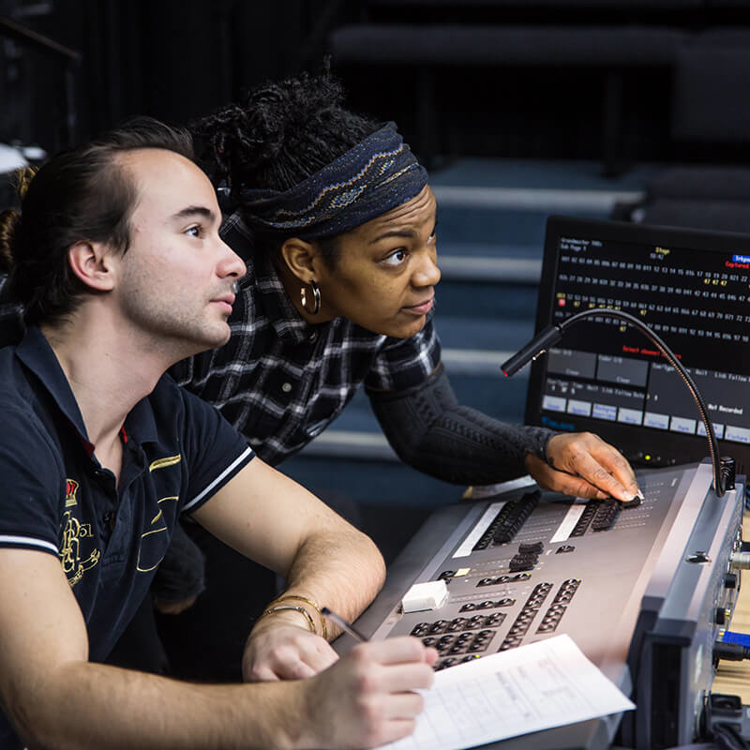
The Student Futures team is here to support you throughout your time at Roehampton and beyond.
They offer services tailored to your needs, helping you take confident steps towards your future.
You’ll have access to a wide range of career workshops and events, where you can engage with employers and develop the skills you need to succeed in the workplace.
These opportunities will help you build your CV, prepare for interviews, and connect with successful Roehampton graduates who are thriving in their careers. You’ll also be able to engage with our partners across London and beyond.
Wherever you want to go in the future, you'll be preparing for the world of work from your very first day.
Learning & assessment
How you’ll learn
Learning on the MFA Dance and Embodied Practice is immersive, collaborative, and hands-on, placing your creative practice at the centre of how you think, move, and create.
You’ll spend your time in:
- Technique classes
- Choreography workshops
- Seminar discussions
- Digital labs
- Practical research sessions
- One-to-one tutorials
- Theatres and performance spaces.
Studio practice at this level encourages advanced technical training through exploration, emphasising dialogue, collaboration, and independent investigation, often informed by ‘flipped classroom’ principles and the sharing of independently developed work.
Classes are designed to invite and respond to the unique knowledge and experiences of each student, recognising the various ways of knowing that each person brings to the programme.
How you'll be assessed
You’ll be assessed through a dynamic mix of creative, practical, and reflective work that mirrors professional practice.
Assessments include live performance, choreographic exploration, facilitation tasks, digital creativity, and written or verbal reflection on your artistic strategies and ideas. From your first day, you’ll gain assessment literacy through clear briefs and regular feedback, helping you develop confidence in articulating your own artistic and critical voice.
Your first year focuses on making dance public, testing your work in studios, theatres, galleries, outdoor sites, and community settings. In your final year, you’ll realise a substantial independent project that brings together your research, creative practice, and professional ambition.
Assessments are designed to capture what matters most in the arts: embodied understanding, originality, collaboration, and independent thinking, cultivating skills that can’t be automated and ensuring you’re ready to thrive in today’s creative industries.
Dance spaces and studios
Large state-of-the-art, purpose-built dance and teaching spaces, designed for dance classes, workshops and movement exploration. Equipped with highly-sprung harlequin floors and underfloor heating.
A dedicated, well-equipped dance studio, perfect for practical dance classes and rehearsals. Equipped with highly-sprung harlequin floors, and a large TV for presentations.
Modern and accessible teaching space supporting dance theory, workshops and rehearsals.
Multipurpose hall, used for workshops, rehearsals and choreographic sharing.
Large and historic (18th-century) room used for teaching, special events and occasional performances.
Professionally rigged 350-seat theatre providing a first-rate performance venue for showcases and productions. Equipped with highly-sprung harlequin floors. Used for teaching, rehearsals and performance.
High-quality dance studio equipped with technology for rehearsals, choreography development, installations, and interdisciplinary creative practice. Equipped with highly-sprung harlequin floors and lighting rig.
Computer labs with extensive software for audio-visual editing of film and sound, and a 95-seat cinema.
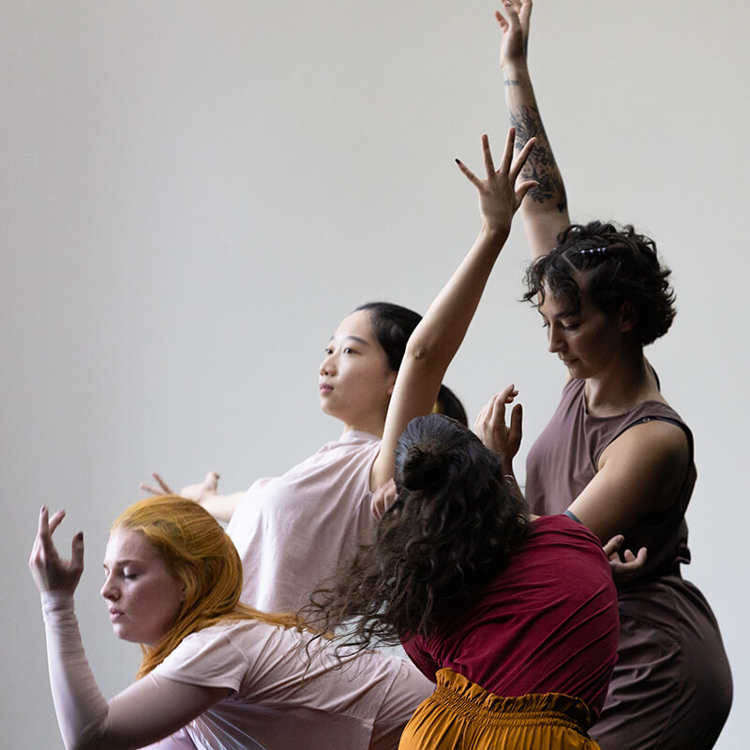
We are experts in dance education
This programme is strengthened as one of a suite of postgraduate dance programmes that offer a rich and wide variety of opportunities for students to encounter and collaborate with other students’ expertise, through participation in modules shared across programmes as well as on individual and collaborative student projects.
Roehampton Dance staff have expertise in a vast variety of dance practice, education and facilitation aspects from global and decolonial practices, choreographic and curatorial, community practice, screendance, etc, and through this, you will gain practical and theoretical knowledge, information and connections.
Staff enjoy strong relationships with a very wide range of international dance artists, companies, choreographers, producers, funders and more. They share their experiences of establishing such relationships through teaching, guest contributions, and wider industry opportunities like student access to workshops, festivals and performances.
Course staff
You will be taught by artists and researchers who are leading specialists in their fields and provide an excellent springboard for you to thrive in your career in dance and the arts.
Open days
Get a real taste of our campus, community and what it’s like to study at Roehampton
Applying
UK postgraduate students apply through our direct application system.
Specific entry requirements
Applicants are required to provide a link to a short video (10 minutes maximum) of them dancing. This can be in a studio or theatre setting as long as the applicant is clearly identified in the video. The work should be accompanied by a short (250words) written statement which reveals the applicant’s interest in developing their dance practice, teaching or leadership.
General entry requirements
International postgraduate students apply through our direct application system.
Specific entry requirements
Applicants are required to provide a link to a short video (10 minutes maximum) of them dancing. This can be in a studio or theatre setting as long as the applicant is clearly identified in the video. The work should be accompanied by a short (250words) written statement which reveals the applicant’s interest in developing their dance practice, teaching or leadership.
General entry requirements
Fees and funding
UK students
Tuition fees
| Entry date | MFA (full-time) | MFA (part-time) |
|---|---|---|
| September 2026 | £11,250 | £5,625 |
Prices shown are for the first year of your degree.
Funding your studies
We also provide other ways to support the cost of living, including on-campus car parking, hardship support and some of the most affordable student accommodation and catering in London.
International students
Tuition fees
| Entry date | MFA (full-time) | MFA (part-time) |
|---|---|---|
| September 2026 | £18,980 | £9,490 |
Prices shown are for the first year of your degree.
Funding your studies
We also provide other ways to support the cost of living, including on-campus car parking, hardship support and some of the most affordable student accommodation and catering in London.


